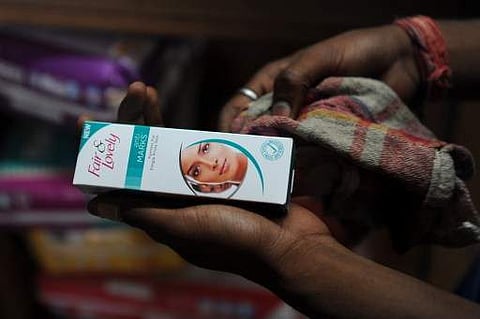

The infamous 'Fair' in 'Fair and Lovely' will be seen no more as Unilever is set to remove words that recognizes a singular ideal of beauty like 'fair/fairness', 'white/whitening', and 'light/lightening' from its products’ packs and communication.
We've all been seeing the 'Fair and Lovely' advertisement since childhood - the one where dark-skinned women are often on the receiving end of discrimination for their colour - a trope portrayed in advertisements for almost four decades.
Today, in 2020, Hindustan Unilever marked its evolution to "a more inclusive vision of beauty" and recognised that the use of "the words ‘fair’, ‘white’ and ‘light’ suggested a singular ideal of beauty" which they thought was wrong.
“The brand is committed to celebrating all skin types. We are making our skin care portfolio more inclusive and want to lead the celebration of a more diverse portrayal of beauty. In 2019, we removed the cameo with two faces and the shade guides from the packaging of Fair & Lovely and the brand communication progressed from fairness to glow which is a more inclusive measure of healthy skin," said Sanjiv Mehta, chairman at HUL.
The moves comes amid the recent uprising in the West against police brutality on the African-American population, and a global backlash against the sale and marketing of skin-lightening products.
Sunny Jain, President Beauty & Personal Care said, "We will also continue to evolve our advertising, to feature women of different skin tones, representative of the variety of beauty across India and other countries. We want Fair & Lovely to become a brand that celebrates glowing and radiant skin, regardless of skin tone."
In a statement released by the company, they wrote, "The brand’s advertising has been changing since 2014, to a message of women empowerment. Fair & Lovely upholds principles that no association should be made between skin tone and a person’s achievement, potential or worth. We are aware that historic advertising is available on the internet; these ads are not aligned with the current values of the brand."
Changes made
Just last year, the packaging was renewed to remove the age-old "before-and-after" impressions and shade guides that indicate a transformation from dark-skinned to lighter-skin tones.
In addition, they changed the brand communication of product benefits to "glow, even tone, skin clarity and radiance."
"To embrace and reflect a more inclusive vision of beauty, the next significant step is to update its brand name," the company said in the release.
They are currently awaiting regulatory requirments of different countries to pass the new name, which has not been released to the public yet.
The company insists that it was never a skin bleaching product. "Fair & Lovely has never been, and is not, a skin bleaching product," it said.
Other brands under Fair & Lovely will also undergo the name changes.
In recent years, many have called the brand out for its discriminatory advertisements and brand communication. A hashtag called "Dark & Lovely" was made to raise awareness about India's obsession with lighter skin tones -- which has been widely covered by western media.
Recently, many Bollywood celebrities were trolled online for being hypocritical -- by featuring in fairness cream ads in India while supporting the 'Black Lives Matter' movement in the West.
Other brands present in the segment are L’Oreal and Emami. It remains to be seen if they, too, make a move. Last week, oral care major Colgate said it would review its Chinese brand called Darlie, whose name translates to mean 'black person toothpaste'. Also, snacks and beverage major PepsiCo plans to rebrand its 130-year-old syrup called Aunt Jemima in the US, intending to move away from its racial history.
(With inputs from Sesa Sen, Express News Service )